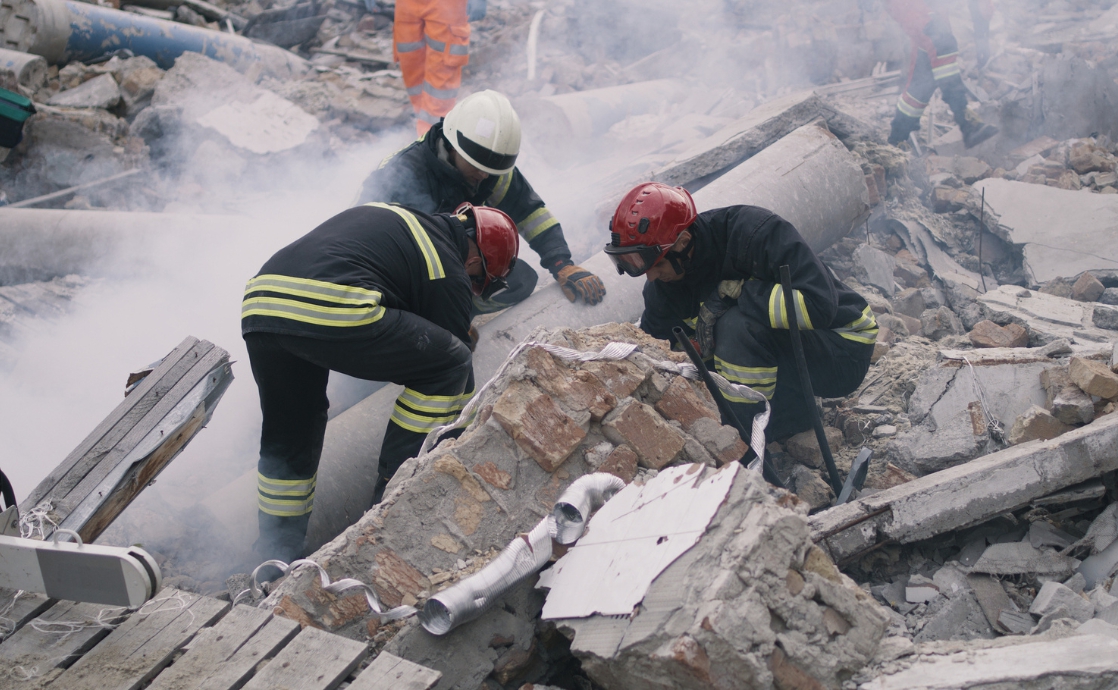The views expressed in our content reflect individual perspectives and do not represent the authoritative views of the Baha'i Faith.
The recent catastrophic earthquake in Turkey and Syria has probably made every thoughtful and empathetic soul ask themselves “What can I do to help?” Here are three suggestions.
1. First, we can stop blaming the Creator, and reflect on the real causes of tragedy.
Devastating natural disasters like the recent major earthquake in Turkey and Syria always prompt this kind of question: “How could a loving God allow so many people to die so terribly?”
We even call these events “acts of God” or “force majeure,” implying that human beings have no responsibility at all for the devastation, and that we need to cast blame on some vengeful deity or Mother Nature instead.
But when any single event kills tens of thousands of innocent people, it forces us to reflect on the human cost – and the human causes. Let’s consider that important question while contemplating why so-called “natural disasters” aren’t that natural at all.
RELATED: 3 Constructive Ways to Respond to Natural Disasters
2. Second, we can support the altruistic charities that assist disaster victims.
After every catastrophic disaster, a wonderful thing happens – the world’s charities, non-profit agencies, and NGOs descend on the afflicted areas to help.
This development marks a fairly recent step in human history. In past centuries, a disaster in any one area usually meant you were on your own, with limited localized and governmental help if you were lucky. But today, with the advent of modern travel and technology, and especially with the heightened altruistic consciousness of so many service organizations and individuals across the globe, help is indeed on the way.
We’ve all seen it happen. When a major earthquake occurs, when a volcano violently erupts, when a hurricane happens, teams of good people rush to those places to help.
The Baha’i teachings commend this kind of humanitarian service, encouraging all people to involve themselves in some way in the kindness and compassion it demonstrates. In a talk he gave in New York City in 1912, Abdu’l-Baha said:
… endeavor that your attitudes and intentions … be universal and altruistic in nature. Consecrate and devote yourselves to the betterment and service of all the human race.
These charitable institutions – the relief agencies, disaster-related charities, and non-profit groups that immediately respond to human tragedy with love – deserve your support. You can give financially, volunteer to assist or donate your time in any way, or just send a note of thanks to those doing that noble work.
3. Third, we can learn how dangerous our built environment is – and work to fix it.
Geophysicists have an old saying: “Earthquakes don’t kill people – buildings kill people.”
Until we built buildings to protect us from the elements, we humans lived in simple, primitive structures, which meant that a major earthquake rarely posed a big concern. In a diary kept by a member of the Lewis and Clark Expedition traversing the Pacific Northwest in the early 1800s, he reported that the ground shook violently one night, making the earth move, the mountains groan, and the trees sway, break, and crash down – but the earthquake did no harm to anyone, because they all slept in tents under the sky.
His story reminds us that many so-called “natural” disasters actually tend to be mostly man-made, instead of some act of vengeance or retribution perpetrated by an angry God. In fact, our own infrastructure poses the greatest threat to us in any earthquake.
You can see this in the horrifying video footage of large multi-story buildings collapsing in the Turkey quake. It is difficult to watch that footage, knowing that those large apartment complexes and hotels and office buildings held many terrified people about to die violent deaths. But in their destruction, if you know what you’re looking for, you can see what caused many of those pancaked buildings to fall. Made of concrete, their destruction shows little evidence of any reinforcement – in other words, they were built without enough steel rebar, the structural bones of concrete construction, which make it more resistant to shaking and ground movement.
Un-reinforced concrete buildings are death traps, because they collapse so easily.
Tom Parsons, a geophysicist with the U.S. Geological Survey, recently told the Washington Post that “It’s heartbreaking, especially when you see a building that was built properly holding up and the one next door is completely collapsed.”
Un-reinforced concrete is a global disgrace – especially in earthquake-prone regions.
Years ago, as a newly-minted journalist fresh out of college, I once covered a construction project in Phoenix, Arizona, where a contractor was building an entire subdivision of new homes. I observed one day as the contractor’s construction workers built the forms and laid down the rebar – the building code-required steel reinforcing rods – before pouring the concrete for the foundation of the first home. Rebar is what makes concrete strong enough for foundations, or for entire buildings – without it, the concrete will eventually crack, collapse, or fail from its own weight.
A building inspector arrived while I watched, observed the structural rebar in its proper place, and signed off on the required inspection form. As soon as he was gone the crew, using a large forklift, picked up the entire rebar “cage,” moved it to the next home’s foundation site, and poured the first concrete foundation – without any reinforcement. That form of cheating to save money, I learned, is fairly common, because you can’t see through concrete, and rebar is expensive.
This kind of corruption, usually driven by materialism and the love of wealth, ultimately harms others. One seismic expert, interviewed recently by the New York Times, recounted the story of his inspections of collapsed buildings after the 1999 Izmir quake in Turkey – and said that he found, in the cracked and crumbled remnants of high-rise buildings, styrofoam in the place of rebar.
All societies have the primary responsibility of protecting their people – but when we allow corruption to flourish, we fail in that duty, just like a shoddy building does when the earth shakes.
Alternatively, with humanity’s remarkable scientific advances in the past several decades, we have learned to find ways to forecast, mitigate, or avoid even the worst natural disasters by turning society’s resources toward protecting the sanctity of human life.
Every human heart is saddened by disasters like the Turkey earthquake. The suffering of the surviving people in Syria and Turkey, and the thousands of deaths of their loved ones, cause us deep grief. The Baha’i teachings urge us to respond to such terrible disasters with not only prayer, but preventive action. A hundred years ago, immediately after the April 15, 1912 sinking of the Titanic, Abdu’l-Baha addressed the question of disaster and our societal response to it in a speech he gave in Washington, D.C.:
Within the last few days a terrible event has happened in the world, an event saddening to every heart and grieving every spirit. I refer to the Titanic disaster, in which many of our fellow human beings were drowned, a number of beautiful souls passed beyond this earthly life. ….
When I think of them, I am very sad indeed. …
Furthermore, these events have deeper reasons. Their object and purpose is to teach man certain lessons. We are living in a day of reliance upon material conditions. Men imagine that the great size and strength of a ship, the perfection of machinery or the skill of a navigator will ensure safety, but these disasters sometimes take place that men may know that God is the real Protector. … These events happen in order that man’s faith may be increased and strengthened. Therefore, although we feel sad and disheartened, we must supplicate God to turn our hearts to the Kingdom and pray for these departed souls with faith in His infinite mercy so that, although they have been deprived of this earthly life, they may enjoy a new existence in the supreme mansions of the Heavenly Father.
Let no one imagine that these words imply that man should not be thorough and careful in his undertakings. God has endowed man with intelligence so that he may safeguard and protect himself. Therefore, he must provide and surround himself with all that scientific skill can produce. He must be deliberate, thoughtful and thorough in his purposes, build the best ship and provide the most experienced captain; yet, withal, let him rely upon God and consider God as the one Keeper.
RELATED: Surviving Disaster by Building Self-Reliant Communities
When earthquakes, tornados, typhoons, and tsunamis strike, as they always do, human beings suffer. But in modern times, their suffering comes not so much from the event itself – it happens instead because of what and where and how we build our structures and shelters.
In the worst disasters, our buildings fall on us, and our own homes injure and kill us. However, we now have the ability to guard against such tragedies – by building the best ship, as Abdu’l-Baha suggested. When we know we live in tornado country, a cellar or a strong shelter is a good idea. When we know we live in tsunami or hurricane country, houses in danger zones should be carefully engineered and constructed, elevated on raised foundations and made to withstand high winds and waves. When we live in earthquake zones, our buildings need added strength as well as the ability to flex and absorb movement. In our civil societies, we need to make sure that building codes, meant to protect everyone in the event of a disaster, are created, codified, and followed.
We’ve now learned enough scientifically that we can guard against and prepare for floods and fires and earthquakes, and just about every other kind of natural disaster. If we value human life and care for others we will expend our efforts to make our families and neighbors and communities safe – and we will refuse to countenance corruption in our cultures, our companies, and our communities.
In other words, we each have part of the responsibility for mitigating future disasters – it is a civilizational imperative to protect our families, and we’re all part of the human family. As Abdu’l-Baha advised, we should all be “deliberate, thoughtful and thorough” in our preparation for the inevitable dangers of this physical life.
















Comments
Sign in or create an account
Continue with Googleor